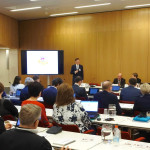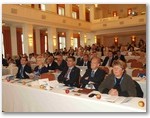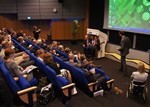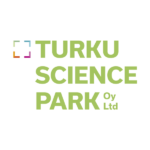Seminar: Creating Value Through Health Data | 29 August 2024 | Tartu, Estonia
Event Date: 29 August 2024
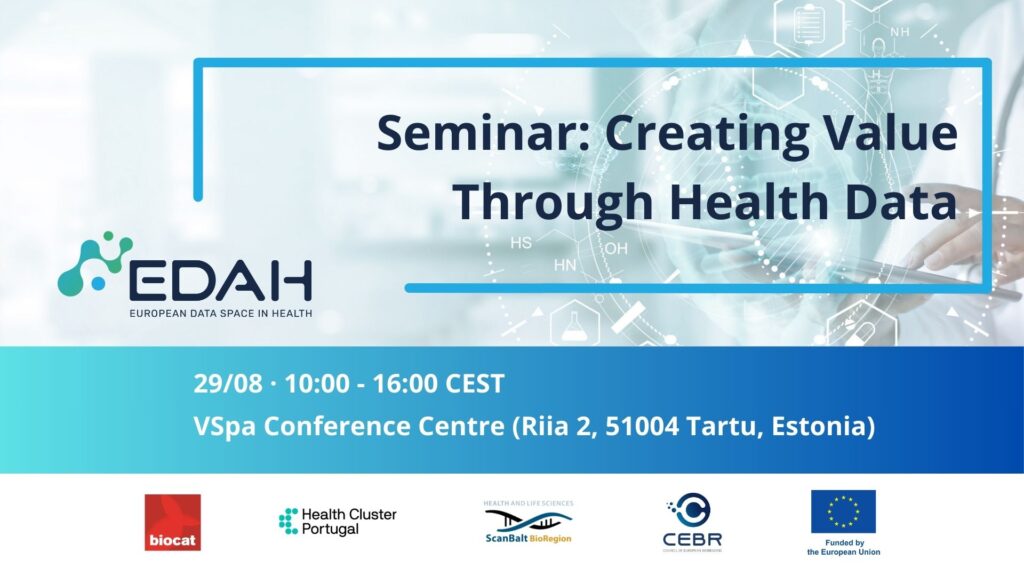
The seminar centres on health data and its potential to drive value and innovation in healthcare.
It will explore contemporary methods, such as blockchain and AI, to create opportunities for donor participation and ensure the fair use of biological material. Discussions will also cover how the European Health Data Space (EHDS) can facilitate data access while safeguarding intellectual property rights and confidentiality. Additionally, the seminar will examine how AI can support personalized medicine and the early diagnosis of complex diseases like Alzheimer’s, as well as the importance of legal and ethical debates in these advancements.
Program
| 10:00-10:30 | Presentation from the University of Tartu – Tõnu Esko, Vice Rector of Development – UniTartu Ventures – Estonian Multiomics Company (EMC) |
| 10:30-12:00 | Including data donors in the value generation flow – Moderator: Maciej Drozdz, founder of SpringLab.tech |
| Progress in discovering biological processes that can be addressed by pharmacological intervention (or other therapeutic methods) is dependent on wide access to human biological material and information. Patient consent agreement is the basic legal agreement between the donor and the biobank and the ultimate user of the patient biomaterial or data resulting from it. There is a conflict of interest between the owner of the biological material and the user. The current legal and technical framework does not allow patients (or biobanks on patients’ behalf) to dynamically adjust (grant or withdraw) permits for a unit of information or biomaterial. The potential value of information contained in biological material is enormous and can lead to key observations that for example to the discovery of molecules that will become drugs and thus generate substantial revenue. At the same time the current modus operandi/business model of biobanks is based on voluntary, altruistic behavior of people who, under certain conditions, agree to make their biological material available to the biobank collection. Is this controversy solvable? The session is aimed to discuss whether and how we can use of modern methods of information management (e.g. blockchain/NFT/AI) in generating an economic model and information technology tools to include donors of biological material in the flow of value generated through the use of their material while enabling users of this material a necessary level of access. | |
| 12:00-12:45 | Lunch |
| 12:45-14:15 | Secondary use of health data and IP rights in the EHDS – Moderator: Elina Drakvik, Sitra |
| The session will focus on discussing how the European Health Data Space (EHDS) should be implemented in an optimal manner, promoting access to data and boosting research and innovation while also addressing IP rights, including trade secrets, through necessary measures to preserve confidentiality when sharing data for secondary use. The EHDS text specifically stipulates that electronic health data containing protected IP and trade secrets should be made available for secondary use but with necessary measures to preserve confidentiality, prescribing this role to Health Data Access Bodies (HDABs). Furthermore, the text stipulates that if measures are deemed to be insufficient to ensure the protection of IP rights or the confidentiality of the data, the HDAB shall refuse the granting of the relevant health data access permit to the health Data User. Practical measures and tools will be needed for HDABs on how to safeguard IP rights, as these rights have effectively fuelled the transformative development and advancements in healthcare and medicine until now. The session will take a deep dive into the subject matter through short presentations and a panel discussion bringing up the views of industry, a Member State and HDAB and discusses first ideas on how to move forward in this complex area in a constructive manner. | |
| 14:15-14:30 | Coffee break |
| 14:30-16:00 | The potential of AI for the early diagnosis of Alzheimer’s – research, law and political standardisation – Moderator: Oliver Stenzel Panellists: Doreen Görß – physician and research associate for clinical dementia research at the German Center for Neurodegenerative Diseases (DZNE), Rostock/ EU projectCAIDX – Clinical AI-based Diagnostics Nicklas Linz – KI:Elements Dag Aarsland – King´s College London/ PREDICTOM/IHI Innovative Health Initiative (europa.eu)) Prof. Eduard Maron – CEO at DocuMental Visiting professor, Imperial College London Ain Aaviksoo – Head of developent/Parnter at Heba Paula Salme Sandrak – Product Strategist (dHealth and AI) at Bayer |
| Artificial intelligence can be a blessing for the medicine of the future. We can use it for the development of new therapies as well as for the early diagnosis of diseases or for the long-term care of patients. Personalized medicine in particular needs the ability to analyze large volumes of data and develop tailored solutions. But there are also high hopes for AI in complex widespread diseases such as Alzheimer’s disease – in particular, timely diagnosis should be made easier and faster by analyzing and linking a wide range of everyday parameters. For some, this is a blessing, while others see it more as a threat. In order to fulfill the expectations placed on it, AI must penetrate deep into the reality of our lives – appropriate legal and political regulation is just as necessary as a broad ethical discourse. In our session, we will approach this complex topic from different angles. |

